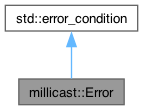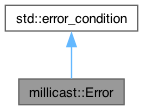millicast::Error Class Reference
The errors reported by the Millicast SDK. More...
#include <error.h>
Inheritance diagram for millicast::Error:

Collaboration diagram for millicast::Error:

Public Member Functions | |
| Error ()=default | |
| Error (Error &&) noexcept=default | |
| Error (const Error &)=default | |
| Error & | operator= (Error &&) noexcept=default |
| Error & | operator= (const Error &)=default |
| Error (int val, const std::error_category &cat) noexcept | |
| Error (int val, const std::error_category &cat, const std::string &error_reason) | |
| Error (const std::exception_ptr &exception) noexcept | |
| template<typename EnumT , typename X = std::enable_if_t<std::is_error_condition_enum<EnumT>::value, void>> | |
| Error (EnumT value) | |
| template<typename EnumT , typename X = std::enable_if_t<std::is_error_condition_enum<EnumT>::value, void>> | |
| Error (EnumT value, const std::string &reason) | |
| template<typename EnumT , typename X = std::enable_if_t<std::is_error_condition_enum<EnumT>::value, void>> | |
| bool | operator== (EnumT val) const |
| const std::string & | message () const |
| Get the error message. | |
Detailed Description
The errors reported by the Millicast SDK.
The Error extends the std::error_condition class, refer to the std::error_condition documentation for basic usage principles.
Additionally, Error can carry a custom per-instance message string.
Constructor & Destructor Documentation
◆ Error() [1/8]
|
default |
◆ Error() [2/8]
|
defaultnoexcept |
◆ Error() [3/8]
|
default |
◆ Error() [4/8]
|
noexcept |
◆ Error() [5/8]
| millicast::Error::Error | ( | int | val, |
| const std::error_category & | cat, | ||
| const std::string & | error_reason ) |
◆ Error() [6/8]
|
noexcept |
◆ Error() [7/8]
template<typename EnumT , typename X = std::enable_if_t<std::is_error_condition_enum<EnumT>::value, void>>
|
inline |
◆ Error() [8/8]
template<typename EnumT , typename X = std::enable_if_t<std::is_error_condition_enum<EnumT>::value, void>>
|
inline |
Member Function Documentation
◆ message()
|
inlinenodiscard |
Get the error message.
- Returns
- the error message.
◆ operator=() [1/2]
◆ operator=() [2/2]
◆ operator==()
template<typename EnumT , typename X = std::enable_if_t<std::is_error_condition_enum<EnumT>::value, void>>
|
inline |
The documentation for this class was generated from the following file:
- api/millicast-sdk/error.h
Generated by